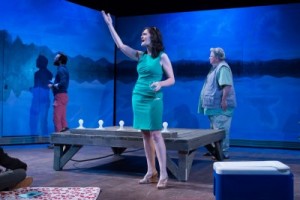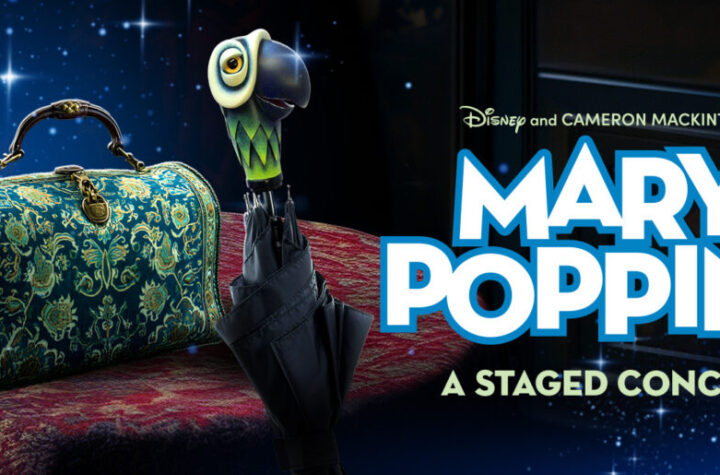
 [rating=4]At one point in Aaron Posner’s Stupid F****ing Bird, (“sort of adapted from Chekov’s The Seagull”) Con (Nate Whelden) tells the writer Trigorin (Cody Proctor) that his secret is “bleakness and misery neatly packaged and tied up with a tidy little bow.” I have no idea whether Chekov had himself in mind when creating the character of Trigorin (I believe the conventional wisdom is that he more closely resembles Konstantin Trepliov (Con in this play), or whether Posner had Chekov in mind when adapting the character—in The Side Show’s revival production, Trigorin certainly looks a bit like Chekov (Costume: Noel Huntzinger). However, Con’s analysis closely resembles my experience of seeing Chekov performed. In productions of his other plays, such as The Cherry Orchard or Three Sisters, polite language and charming or eccentric character’s often conceal truly dire and tragic situations and behaviors.
[rating=4]At one point in Aaron Posner’s Stupid F****ing Bird, (“sort of adapted from Chekov’s The Seagull”) Con (Nate Whelden) tells the writer Trigorin (Cody Proctor) that his secret is “bleakness and misery neatly packaged and tied up with a tidy little bow.” I have no idea whether Chekov had himself in mind when creating the character of Trigorin (I believe the conventional wisdom is that he more closely resembles Konstantin Trepliov (Con in this play), or whether Posner had Chekov in mind when adapting the character—in The Side Show’s revival production, Trigorin certainly looks a bit like Chekov (Costume: Noel Huntzinger). However, Con’s analysis closely resembles my experience of seeing Chekov performed. In productions of his other plays, such as The Cherry Orchard or Three Sisters, polite language and charming or eccentric character’s often conceal truly dire and tragic situations and behaviors.
In his “sort of” adaptation of The Seagull, Aaron Posner has unceremoniously untied the bow and shred the wrapping paper to pieces: polite speech, from the title onward, has disappeared, and there is nothing decorous or charming in the behavior or speech of Chekov’s character’s modern counterparts. Their pathologies are laid bare, and the extremity of their actions and emotions reveal the depth of their pathologies. Lest we get distracted, Shamrayev, the most benignly ridiculous of Chekov’s character’s, has been excised while Dorn, the Doctor, has been fused with Sorin, Irena Nikolaveyna’s brother, to simplify the plot (They have been renamed Sorn (Norman Woodel) and Nina (Nina O’Keefe) respectively). Likewise, Medviedenko and Masha have been turned into Dev (Matt Fletcher) and Mash (Katy Carolina Collins).
In Posner’s play, character’s more freely confess to and reveal what they are. Nina admits to being a woman who has made extremely bad life choices and employed poor parenting skills in soliloquy, asides, and simply in her onstage behavior (Chekov’s script sometimes manages to make us full-heartedly forgive, or at least, indulge his character’s very tragic failings). Here, what appears to be Konstantin Tepliov’s quiet but fatal neurosis in The Seagull explodes in the character of Con while Mash never remotely suggests that there is anything polite or appreciatory in her rejection of Dev’s suit, or indeed anything polite or appreciatory about her character in general. Dev’s rechristening is both merciful and appropriate: people don’t think he is “kind of a boob” because he is a pretentious but because he is full of simplicity, kindness, and homespun wisdom. Mash takes drinking “openly, not secretly” to a whole new level, and is equally open about her motivations, explaining she is responding to simple cosmic and social doom. As she puts it, “If God needs to laugh this badly” than all we are really after is “someone to snuggle up against at night in the hopes that they might just maybe be able to make us forget what actually know.”
Sometimes, it would be a relief to hear Chekov’s character’s talk this way, but Posner’s dialogue, as his title suggests, is not always that lyrical: it can be bitingly funny, excessively crude and offensive, heavily meta-theatrical, but like the character’s pathologies, it is never subtle or polite. Nonetheless, he is able to stick closely to the outline of Chekov’s plot and force us to look at the character’s suffering in a new light while still making the whole thing very and overtly funny.
 In playing their character’s director John L. Green’s actors are up against an extremely difficult task because they have to inhabit Posner’s adaptations while being mindful and referencing their Chekovian antecedents from “The Seagull.” For the most part, they acquit themselves more than admirably. The dialogue is delivered extremely well and humorously by each actor. However, sometimes in their freedom from the constraints of the niceties of Chekov’s character’s 19thc language and etiquette, they give into over-acting. Stacy Stoltz, in particular can be a little to whiny and immature as Emma, and at times O’Keefe begins to border on a caricature of a modern actresses in her portrayal of Nina. Conversely, Wheldon’s Con, while breathless demonstrating manic energy and panic could have gone a little heavier on the depth of his underlying suffering, especially as there are some haunting moments in Posner’s script explicitly indicating its extremity. Collins and Fletcher were a delight as Mash and Dev respectively, and while sometimes lacking chemistry with O’Keefe, Norman Woodel’s flawlessly executed avuncular charisma, Jokes, and running commentary remind us that the play’s antecedent could be none other than something penned by Chekov.
In playing their character’s director John L. Green’s actors are up against an extremely difficult task because they have to inhabit Posner’s adaptations while being mindful and referencing their Chekovian antecedents from “The Seagull.” For the most part, they acquit themselves more than admirably. The dialogue is delivered extremely well and humorously by each actor. However, sometimes in their freedom from the constraints of the niceties of Chekov’s character’s 19thc language and etiquette, they give into over-acting. Stacy Stoltz, in particular can be a little to whiny and immature as Emma, and at times O’Keefe begins to border on a caricature of a modern actresses in her portrayal of Nina. Conversely, Wheldon’s Con, while breathless demonstrating manic energy and panic could have gone a little heavier on the depth of his underlying suffering, especially as there are some haunting moments in Posner’s script explicitly indicating its extremity. Collins and Fletcher were a delight as Mash and Dev respectively, and while sometimes lacking chemistry with O’Keefe, Norman Woodel’s flawlessly executed avuncular charisma, Jokes, and running commentary remind us that the play’s antecedent could be none other than something penned by Chekov.
The Props. (Cassy Schillo), the Set, and Scenic Design (Joe Schermoly) which called for more than one location and was used creatively, were impressive and convincing. The musical pieces were diligently performed and extremely amusing (Sound: Christopher M. LaPorte), and the entire technical crew took great advantage of the large stage. Stupid F***ing Bird runs at Victory Garden Theatre’s through August 30th, 2015 located at 2433 Lincoln Avenue. Productions are Wednesday Through Saturday at 7:30 pm. With Matinees Saturday and Sunday at 2:00 pm. Regular Tickets are $15 through $49. They can be purchased at www.victorygardens.org or by calling the Victory Gardens Box Office at 773-871-3000. To see what others are saying, visit www.theatreinchicago.com, go to Review Round-up and click at “Stupid F***ing Bird”.






More Stories
“Mary Poppins : A Staged Concert” reviewed by Julia W. Rath
” I and You”
“Johnny Cobweb” reviewed by Mark Reinecke